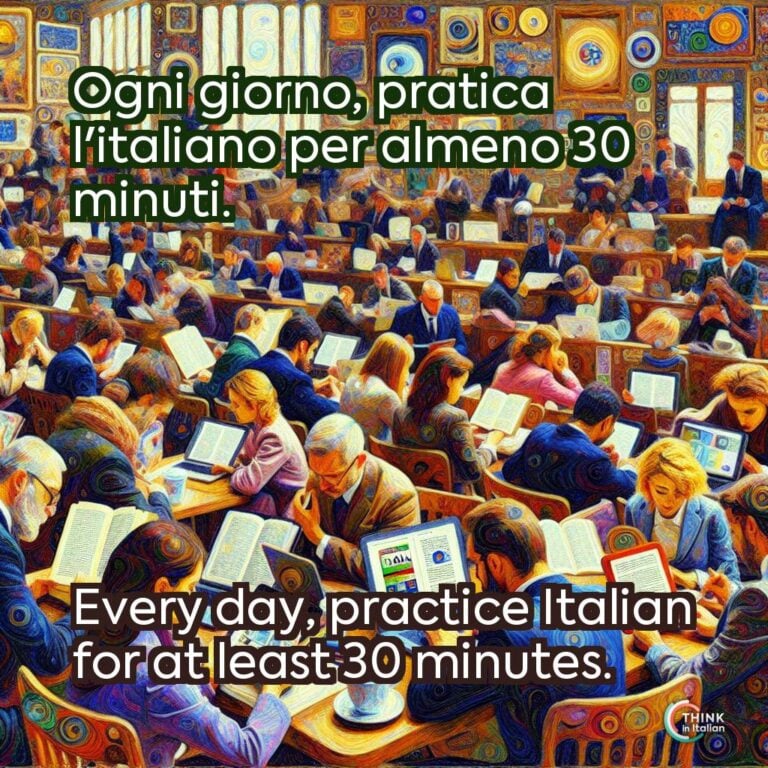B2 Level in Italian
What is B2 Level?
B2 is a relatively high level as expressed by the Common European Framework of Reference for Languages (CEFR). It corresponds to an upper-intermediate knowledge of a language, which allows you to have advanced conversations with native speakers.
When you reach B2 level in Italian, it means that you have become an independent user of the language. This level is often sufficient for living in Italy, engaging in work activities, or pursuing studies.
B2 learners can understand the main ideas of complex texts, they can follow extended speeches and complex lines of argument, read articles and reports that express particular attitudes or viewpoints, and produce clear, detailed text on a wide range of subjects.
Why Should I Reach B2 Level in Italian?
As many language learners say, Italian is one of the most beautiful languages in the world. It is chosen as second language by over 18 millions people, which allows the Italian language to rank among the most spoken languages in the world.
For me, B2 level of a language is when you can proudly say “I speak that language!“, so if you want to be able to speak Italian properly, my advice is that you push until here at least.
Reaching the B2 level in Italian offers several advantages, especially if you’re looking to deepen your language skills beyond basic communication. Here are a few reasons why I think you should set this goal:
- Improved communication skills: At B2 level, you can communicate with native Italian speakers with a good degree of fluency and spontaneity. This is crucial for effective social interactions, professional communications, and everyday situations.
- Cultural understanding: This level allows you to understand and appreciate Italian culture more deeply. You can engage with local media, understand idiomatic expressions, and jokes.
- Educational and professional opportunities: Many universities and companies require a B2 level of proficiency for admission or employment. This level is often considered sufficient for studying in Italian or working in an Italian-speaking environment.
- Personal satisfaction and confidence: Reaching B2 is a significant achievement that can boost your confidence in your language skills. It can also enhance your travel experiences in Italy or other Italian-speaking regions, allowing for richer interactions and understanding.
How Long Does it Take to Reach B2 Level?
How long it takes you to learn Italian depends on some individual factors. Learning a language, in general, requires time commitment and consistent practice, which might lead you to organize your daily routines round language study.
In addition, age can play a significant role: the older you get, the more your brain’s plasticity decreases, making it generally more difficult to absorb and retain new language structures.
Finally, motivation is an important factor to keep in mind. It can fluctuate, particularly when progress slows down due to the intricate grammatical rules that some languages have.
In general, the CEFR illustrates that there exist some trends in language learning paths, which I will resume in the table below:
| CEFR level | Number of hours of instruction |
| Zero to A1 | 100-150 hours |
| A1 to A2 | 100-150 hours
From Zero: |
| A2 to B1 | 100-200 hours
From A1: |
| B1 to B2 | 150-200 hours
From Zero: |
| B2 to C1 | 200-250 hours
From Zero: |
| C1 to C2 | 200-250 hours
From Zero: |
For instance, if you start studying Italian from zero and want to focus on it “full-time” – perhaps for 4 hours per day for a total of 20 hours a week – you will reach the B2 level in 8 months.
Of course, this is a general estimation of what usually works based on statistics. But you can personalize your study path.
The Best Way to Reach Italian B2 Level
For language learners, there are many ways to learn a new language, but for me, the best ways to learn Italian is to immerse yourself in the language.
Use the language every day: to communicate with native speakers or other language students, to grocery shop, to watch movies… The more you are exposed to the language, the faster you will learn Italian.
If you want to have a specific approach, here is my advice that can help you master Italian more efficiently:
- Structured courses: Start with a structured course either online or in a classroom setting. This will give you a solid foundation in grammar, vocabulary, and essential language skills.
- Immersive learning: As I mentioned before, I believe that this is the best way to learn Italian. Watch Italian movies, listen to Italian music, podcasts, and radio. Immersion helps with understanding real-world usage of the language and improves listening skills.
- Practice speaking: Language exchange partners, conversation groups, or tutors can be very useful for this. Look for opportunities to speak with native speakers, which is crucial for fluency and learning colloquial phrases.
- Regular revision: Language learning requires repetition. Spend some time daily to regularly revisit previous lessons. This will help you consolidate memory and improve language retention.
- Cultural integration: Understanding cultural context enhances language learning. Participate in Italian cultural events, cook Italian recipes, and learn about the country’s history and traditions.
- Goal setting: I am a very organized person, and this usually makes learning easier. Set specific, measurable, achievable, and relevant goals to keep your learning process directed and motivated.
This holistic approach not only makes learning more enjoyable but also more effective in achieving fluency. This is the best way to learn a language. You need to immerse yourself in the language so you can learn it naturally.
Road to B2
If you want to learn Italian, I am sure you do not only want to know the most basic sentences. Italian is such a rich language that, for me, it is worth diving into the grammar and vocabulary to enjoy all its nuances.
Reaching a B2 level in Italian is a rewarding journey but, as you now know, its duration varies based on several factors. Guidelines do suggest that it typically requires about 600 hours of study, but your own path to proficiency can be shorter or longer.
Remember, mastering Italian to a B2 level not only enhances your communication abilities but also deepens your cultural understanding, and opens up new personal and professional opportunities.
Stay motivated, make use of different resources, and keep your learning experience fun and engaging in order to achieve your language goals.
Start learning the Italian language today!
Feel motivated and looking for a challenge? Then try learning Italian in 3 months.






